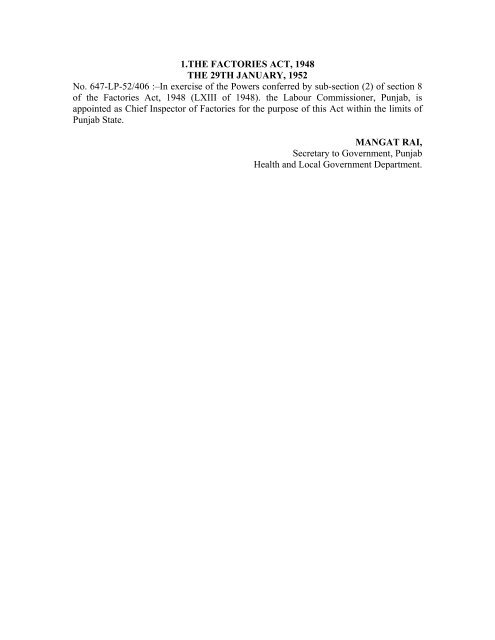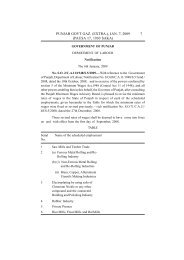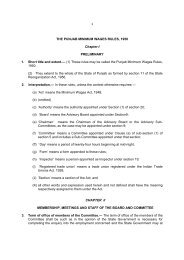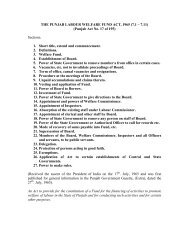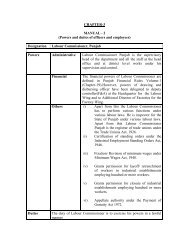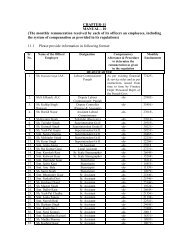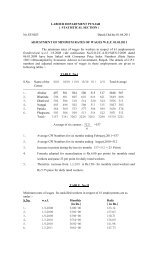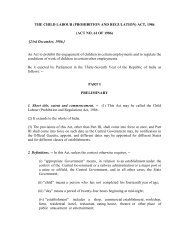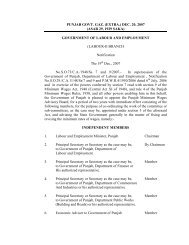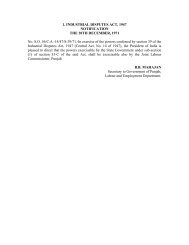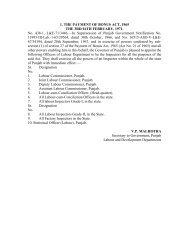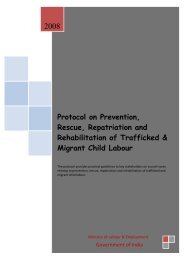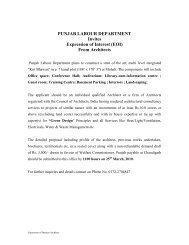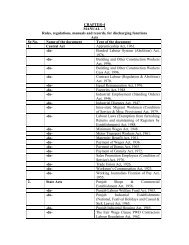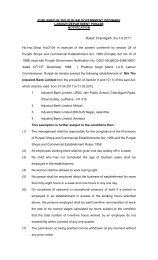The Factories Act, 1948 - Department of Labour, Government of ...
The Factories Act, 1948 - Department of Labour, Government of ...
The Factories Act, 1948 - Department of Labour, Government of ...
- No tags were found...
You also want an ePaper? Increase the reach of your titles
YUMPU automatically turns print PDFs into web optimized ePapers that Google loves.
1.THE FACTORIES ACT, <strong>1948</strong>THE 29TH JANUARY, 1952No. 647-LP-52/406 :–In exercise <strong>of</strong> the Powers conferred by sub-section (2) <strong>of</strong> section 8<strong>of</strong> the <strong>Factories</strong> <strong>Act</strong>, <strong>1948</strong> (LXIII <strong>of</strong> <strong>1948</strong>). the <strong>Labour</strong> Commissioner, Punjab, isappointed as Chief Inspector <strong>of</strong> <strong>Factories</strong> for the purpose <strong>of</strong> this <strong>Act</strong> within the limits <strong>of</strong>Punjab State.MANGAT RAI,Secretary to <strong>Government</strong>, PunjabHealth and Local <strong>Government</strong> <strong>Department</strong>.
2. THE FACTORIES ACT, <strong>1948</strong>THE 17TH SEPTEMBER, 1963No. 7815-IV-Lab-1163/20609 :–In supersession <strong>of</strong> Punjab <strong>Government</strong>, <strong>Labour</strong><strong>Department</strong>, Notification No. 3981-VII-D Lab 61/31388, dated 21st September, 1962 andin exercise <strong>of</strong> the power conferred by sub-section (i) <strong>of</strong> section 85 the factories <strong>Act</strong>, <strong>1948</strong>(<strong>Act</strong> LXIII <strong>of</strong> <strong>1948</strong>) and all other powers enabling him this behalf, the Governor <strong>of</strong>Punjab is pleased to declare the the provisions <strong>of</strong> Chapter I except the provisions <strong>of</strong>submission <strong>of</strong> plans and specification and those <strong>of</strong> Chapter II, IV, VI, VII, VIII, X and XI<strong>of</strong> the said <strong>Act</strong> shall apply to any place in the State wherein any manufacturing process <strong>of</strong>sawing timber is carried on, not-with-standing that :–(i) <strong>The</strong> No. <strong>of</strong> persons employed therein is less then 10 if working with the aid <strong>of</strong> powerand less than 20 if working without the aid <strong>of</strong> power.(ii) <strong>The</strong> persons working therein are not employed by the owner there<strong>of</strong> but are workingwith the permission <strong>of</strong> or under agreement with such owner, provided that themanufacturing process, not being carried on by the owner only with the aid <strong>of</strong> his familymembers.
3. THE FACTORIES ACT, <strong>1948</strong> ORDERTHE 20TH OCTOBER, 1964No. 10280-IV-Lab.-64/24662 :–Where as the persons having control over the affairs <strong>of</strong>Punjab <strong>Government</strong>, Printing Press, Patiala have requested for the grant <strong>of</strong> exemptionfrom the provisions <strong>of</strong> Chapter VIII <strong>of</strong> the <strong>Factories</strong> <strong>Act</strong>, <strong>1948</strong> (<strong>Act</strong> No. LXIII <strong>of</strong> <strong>1948</strong>)relating to annual leave with wages.And whereas the Governor <strong>of</strong> Punjab is satisfied that the leave rules applicable to theworkers in the said factory provide benefits which are not less favourable then those forwhich chapter VIII <strong>of</strong> <strong>Factories</strong> <strong>Act</strong>, <strong>1948</strong> (<strong>Act</strong> No. LXIII <strong>of</strong> <strong>1948</strong>) makes provision.Now, therefore, in exercise <strong>of</strong> the powers conferred by the section 84 <strong>of</strong> the <strong>Factories</strong><strong>Act</strong>, <strong>1948</strong>, (<strong>Act</strong> No. LXIII <strong>of</strong> <strong>1948</strong>), the Governor <strong>of</strong> Punjab is pleased to exempt PunjabGovt. Printing Press, Patiala, from the provisions <strong>of</strong> Chapter VIII <strong>of</strong> the said <strong>Act</strong>, relatingto annual leave with wages, subject to the condition that this exemption shall not beapplicable to the casual workers <strong>of</strong> this factory.Sd/.....................Secretary to <strong>Government</strong>, Punjab<strong>Labour</strong> <strong>Department</strong>.
4. THE FACTORIES ACT. <strong>1948</strong>THE 10TH AUGUST, 1965No. 6363-VI-Lab. II-65/20707 :–Whereas the persons having control over the affairs <strong>of</strong>M/s Hindustan Milk Food Manufactures Ltd. Nabha have requested for the grant <strong>of</strong>exemption from the provisions <strong>of</strong> Chapter VIII <strong>of</strong> the <strong>Factories</strong> <strong>Act</strong>, <strong>1948</strong> (<strong>Act</strong> No. 63 <strong>of</strong><strong>1948</strong>) relating to annual leave with wages.And whereas the Governor <strong>of</strong> Punjab is satisfied that the leave rules applicable to thestaff members in the said factory provide benefits which are not less favourable thanthose for which Chapter VIII <strong>of</strong> the <strong>Factories</strong> <strong>Act</strong>, <strong>1948</strong>), (<strong>Act</strong> No. 63 <strong>of</strong> <strong>1948</strong>), makeprovisions.Now, therefore, in exercise <strong>of</strong> the powers conferred by section 84 <strong>of</strong> the <strong>Factories</strong> <strong>Act</strong>,<strong>1948</strong> (<strong>Act</strong> No. 63 <strong>of</strong> <strong>1948</strong>), the Governor <strong>of</strong> Punjab is pleased to exempt M/s HindustanMilk Food Manufacturers Ltd., Nabha from the provisions <strong>of</strong> Chapter VIII <strong>of</strong> the said<strong>Act</strong>, relating to annual leave with wages subject to the conditions that this exemptionshall be applicable only to the staff members <strong>of</strong> the Factory.Sd/....................Secretary to <strong>Government</strong>, Punjab<strong>Labour</strong> and Employment <strong>Department</strong>s.
5. THE FACTORIES ACT, <strong>1948</strong>THE 13TH OCTOBER, 1969No. S.O. 74/C.A. 63/48/S 86M/69. :–In exercise <strong>of</strong> the powers conferred by sub-section(1) <strong>of</strong> section 85 <strong>of</strong> the <strong>Factories</strong> <strong>Act</strong>, <strong>1948</strong> (<strong>Act</strong> No. 63 <strong>of</strong> <strong>1948</strong>) and all other powerenabling him in this behalf the Governor <strong>of</strong> Punjab is pleased to declare that henceforthall the provisions <strong>of</strong> the <strong>Factories</strong> <strong>Act</strong>, <strong>1948</strong>, except Section 6 (Submission <strong>of</strong> plans) 11,17, 19, 20 and 62 shall apply to all the establishments in the State <strong>of</strong> Punjab whereinmanufacturing process <strong>of</strong> making/burning <strong>of</strong> bricks is carried on with or without the aid<strong>of</strong> power or is so ordinarily carried on, not-with-standing that :–(i) the number <strong>of</strong> persons employed therein is less then ten, if working with the aid <strong>of</strong>power and less than twenty, if working without the aid <strong>of</strong> power., or(ii) the persons working therin are not employed by the owner there<strong>of</strong> but are workingwith the permissions <strong>of</strong> or, under agreement with such owner.Piovided that the manufacturing process is not being carried on by the owners only withthe aid <strong>of</strong> his family.V.P. MALHOTRASecretary <strong>of</strong> Goverment, Punjab,<strong>Labour</strong> and Employment <strong>Department</strong>
6. THE FACTORIES ACT, <strong>1948</strong>THE 22ND JUNE, 1970No. 4517-3LE (68-F) 70/16500 :—In super-session <strong>of</strong> Punjab <strong>Government</strong>, <strong>Labour</strong><strong>Department</strong>, notification No. 8714-3LE (68-F)-68/25403 dated 29th August, 1968 , andin exercise <strong>of</strong> the powers conferred by sub-section (5) <strong>of</strong> Section 8 <strong>of</strong> the <strong>Factories</strong> <strong>Act</strong>,<strong>1948</strong> (<strong>Act</strong> No. 63 <strong>of</strong> 1949), and all other powers enabling him in this behalf, the<strong>Government</strong> <strong>of</strong> Punjab is pleased to appoint the following <strong>of</strong>ficers <strong>of</strong> the Punjab <strong>Labour</strong><strong>Department</strong> to be additional Inspector <strong>of</strong> <strong>Factories</strong> for the purpose <strong>of</strong> the said <strong>Act</strong>, and isfurther pleased to declare that they shall exercise the powers <strong>of</strong> additional Inspector <strong>of</strong><strong>Factories</strong> throughout the State <strong>of</strong> Punjab :—(1) Joint <strong>Labour</strong> Commissioner, Punjab.(2) Deputy <strong>Labour</strong> Commissioner, Punjab.(3) Assistant <strong>Labour</strong> Commissioner, Punjab.(4) All <strong>Labour</strong>-cum-Conciliation <strong>of</strong>ficers in the State.
7. THE FACTORIES ACT, <strong>1948</strong>NOTIFICATIONTHE 29TH MARCH, 1971No. S. O. 17/C.A. 63/48/S. 8/71.—In Supersession <strong>of</strong> Punjab <strong>Government</strong>, <strong>Labour</strong><strong>Department</strong> Notification No. 4527-3LE (6&F)-70/17.115, dated 27th June, 1970, and inexercise <strong>of</strong> the powers conferred by sub-section (1) <strong>of</strong> section 8 <strong>of</strong> the <strong>Factories</strong>, <strong>Act</strong>,<strong>1948</strong> (<strong>Act</strong> No. 63 <strong>of</strong> <strong>1948</strong>), and all other powers enabling him in his behalf, the Governor<strong>of</strong> Punjab is pleased to appoint all the <strong>Labour</strong> Inspectors Grade I and Grade II in the State<strong>of</strong> Punjab to be ‘‘Inspectors’’ for the purpose <strong>of</strong> the said <strong>Act</strong>. <strong>The</strong>y shall exercise all thepowers <strong>of</strong> an Inspector under the said <strong>Act</strong> throughtout the State <strong>of</strong> Punjab with immediateeffect.V.P. MALHOTRA,Secretary <strong>of</strong> <strong>Government</strong>, Punjab,<strong>Labour</strong> and Employment <strong>Department</strong>s.
8. THE FACTORIES ACT, <strong>1948</strong><strong>The</strong> 29th March, 1971 No. S.O. 19CA-/63/48/S-85/71 :- In exercise <strong>of</strong> the powersconferred by Sub-section exercise <strong>of</strong> the powers conferred by Sub-section (1) <strong>of</strong> section85 <strong>of</strong> the <strong>Factories</strong> <strong>Act</strong>, <strong>1948</strong> (Central <strong>Act</strong>. No. LXIII <strong>of</strong> <strong>1948</strong>) and all other powersenabling him in this behalf, the Governor <strong>of</strong> Punjab is pleased to declared that henceforthall the provisions <strong>of</strong> the said <strong>Act</strong>, shall apply to all the establishment in the State <strong>of</strong>Punjab where in manufacturing process in synthetic colouring matter or its intermediatesis carried on with or without the aid <strong>of</strong> power or is so ordinarily carried on, not withstanding that :—(i) the number <strong>of</strong> persons employed there in is less then ten, if working with the aid <strong>of</strong>powerand less then twenty, if working without the aid <strong>of</strong> power : or(ii) the person working therein are not employed by the owner there<strong>of</strong> but are workingwith the permission <strong>of</strong>, or under agreement with, such owner :Provided that the manufacturing process is not being carried on by the owner only withthe aid <strong>of</strong> his family,.V.P. MALHOTRASectretary <strong>of</strong> <strong>Government</strong>, Punjab,<strong>Labour</strong> and Employment <strong>Department</strong>s.
9. THE FACTORIES ACT, <strong>1948</strong>THE 2ND JUNE, 1971No. S.O. 32/C.A. 63/48/S. 8/71/ :—In super-session <strong>of</strong> Punjab <strong>Government</strong> <strong>Labour</strong><strong>Department</strong> notification No. 5923-LP-49/50200, dated the 11th August, 1949 and inexercise <strong>of</strong> the power conferred by sub-section (5) <strong>of</strong> section 8 <strong>of</strong> the <strong>Factories</strong> <strong>Act</strong>, <strong>1948</strong>(<strong>Act</strong> No. LXIII <strong>of</strong> <strong>1948</strong>), the <strong>Government</strong> <strong>of</strong> Punjab is pleased to appoint the following<strong>of</strong>ficers <strong>of</strong> the Punjab Health <strong>Department</strong> to be additional Inspectors <strong>of</strong> <strong>Factories</strong>, withinthe limits <strong>of</strong> their respective jurisdiction for the purpose <strong>of</strong> section 11 to 15, 18 to 20, 42,48, 89 to 91 only <strong>of</strong> the said <strong>Act</strong> :—S.No. Designation1. Director, Health and Family Planning, Punjab.2. Deputy Director, Health Services (Health).3. All the Deputu Chief Medical Officers (Health)4. Assistant Director, Health Services (Health Education and Nutrition)5. All Municipal Medical Officer <strong>of</strong> Health6.7. B.B. MAHAJANSecretary <strong>of</strong> <strong>Government</strong>, Punjab,<strong>Labour</strong> and Employment <strong>Department</strong>s.
10. THE FACTORIES ACT, <strong>1948</strong>THE 1ST APRIL, 1977No. S.O. 23/C.A. 63/48/S. 8/77 :—In exercise <strong>of</strong> the power conferred by sub-section(5) <strong>of</strong> section 8 <strong>of</strong> the <strong>Factories</strong> <strong>Act</strong>, <strong>1948</strong> (<strong>Act</strong> No. 63 <strong>of</strong> <strong>1948</strong>), the Governor <strong>of</strong> Punjabis pleased to appoint the following <strong>of</strong>ficers <strong>of</strong> the Local <strong>Government</strong> (Fire Wing)<strong>Department</strong>, Punjab to be additional Inspectors for the purpose <strong>of</strong> section 38 <strong>of</strong> the said<strong>Act</strong> within the local limits <strong>of</strong> their respective juridiction :—(1) Fire Officer, Punjab.(2) Assistant Fire Officer, Punjab.(3) Fire Protection Officer, Punjab
11. THE FACTORIES ACT, <strong>1948</strong>No. S.O. 24/I. F.R./52/R. 19/77 :—In persuance <strong>of</strong> the provisions <strong>of</strong> sub-rule (2) <strong>of</strong> rule19 <strong>of</strong> the Punjab Factory Rules, 1952, the Governor <strong>of</strong> Punjab is pleased to appoint theChairman <strong>of</strong> the Punjab State Board for the Prevention <strong>of</strong> Control <strong>of</strong> Water Pollution asthe authority for the purpose <strong>of</strong> the aforesaid sub-rule.
12. THE FACTORIES ACT, <strong>1948</strong>NOTIFICATIONTHE 30TH, OCTOBER, 1991No. S.O. 89/C.A. 63/48/S. 10/91 :—In supersession <strong>of</strong> Punjab <strong>Government</strong> <strong>Labour</strong><strong>Department</strong> Notification No. 8997-L & E-77) 1737, dated the 16th January, 1978 and inexercise <strong>of</strong> the powers conferred by Sub-section (1) <strong>of</strong> section 10 <strong>of</strong> the <strong>Factories</strong> <strong>Act</strong>,<strong>1948</strong> (Central <strong>Act</strong> No. 63 <strong>of</strong> <strong>1948</strong>) and all other powers enabling him in this behalf, thePresident <strong>of</strong> India is pleased to appoint all the Assistant Directors <strong>of</strong> <strong>Factories</strong> (Madical)<strong>of</strong> the <strong>Department</strong> <strong>of</strong> <strong>Labour</strong> and Employment Punjab to be Certifying Surgeons for thepurpose <strong>of</strong> the said <strong>Act</strong> for whole <strong>of</strong> the State <strong>of</strong> Punjab.GURBINDER CHAHALSecretary <strong>of</strong> <strong>Government</strong>, Punjab,<strong>Department</strong>s <strong>of</strong> <strong>Labour</strong> and Employment
13. THE FACTORIES ACT, <strong>1948</strong>THE 1ST AUGUST, 1979No. 2923-2 Lab-II 79/760 :—Whereas the management <strong>of</strong> Punjabi University Press,Patiala have requested the State <strong>Government</strong> for the grant <strong>of</strong> exemption from theprovisions <strong>of</strong> Chapters VI and VIII <strong>of</strong> the <strong>Factories</strong> <strong>Act</strong>, <strong>1948</strong> (Central <strong>Act</strong> 63 <strong>of</strong> <strong>1948</strong>)And whereas the Governor <strong>of</strong> Punjab is satisfied that the provisions <strong>of</strong> the scheme submittedby the said management in respect <strong>of</strong> employment intervals for meals and leavewith wages <strong>of</strong> the persons employed in or attending the press are not less favourable thanthe corres-ponding provisions <strong>of</strong> the said <strong>Act</strong>, relating to the aforesaid matters.Now, therefore in exercise <strong>of</strong> the powers conferred by section 86 <strong>of</strong> the <strong>Factories</strong> <strong>Act</strong>,<strong>1948</strong> (Central <strong>Act</strong>, 63 <strong>of</strong> <strong>1948</strong>), the Governor <strong>of</strong> Punjab is pleased to exempt theaforesaid press from the provisions <strong>of</strong> Chapters Vi and VII <strong>of</strong> <strong>Factories</strong> <strong>Act</strong>, <strong>1948</strong>
14. THE FACTORIES ACT, <strong>1948</strong>THE 21ST JANUART, 1981No. 2(39) 80-4 Lab. 1/205 :—In exercise <strong>of</strong> the powers conferred by sub-section (5) <strong>of</strong>section 8 <strong>of</strong> <strong>Factories</strong> <strong>Act</strong>, <strong>1948</strong> (central <strong>Act</strong> No. 63 <strong>of</strong> <strong>1948</strong>), the Governor <strong>of</strong> Punjab ispleased to appoint the following <strong>of</strong>ficers <strong>of</strong> the <strong>Department</strong> <strong>of</strong> <strong>Labour</strong> and Employment(<strong>Labour</strong> Branch) Punjab to be Additional Inspector for whole <strong>of</strong> the State <strong>of</strong> Punjab forrequiring the production <strong>of</strong> any prescribed Register and any other document relating tothe factory under Section 9 (b) <strong>of</strong> the aforsaid <strong>Act</strong> :—(1) Scrutiny Inspector(2) Field InvestigatorsJ.P. GUPTASecretary <strong>of</strong> <strong>Government</strong>, Punjab<strong>Department</strong> <strong>of</strong> <strong>Labour</strong> and Employment
15. THE FACTORIES ACT, <strong>1948</strong>NOTIFICATIONTHE 3RD SEPTEMBER, 1979No. S.O. 57/CA/63/48/S. 8/79 :—In exercise the powers conferred by Sub-section (5) <strong>of</strong>section 8 <strong>of</strong> <strong>Factories</strong> <strong>Act</strong>, <strong>1948</strong> (Central <strong>Act</strong> 63 <strong>of</strong> <strong>1948</strong>), <strong>The</strong> Governor <strong>of</strong> Punjab ispleased to appoint the Additional <strong>Labour</strong> Commissioner Punjab to be an AdditionalInspector for the purpose <strong>of</strong> the said <strong>Act</strong> for whole <strong>of</strong> the State <strong>of</strong> Punjab.TEJENDRA KHANNASecretary <strong>of</strong> <strong>Government</strong> <strong>of</strong> Punjab,<strong>Department</strong> <strong>of</strong> <strong>Labour</strong> and Employment
16. THE INTRODUCTIONS UNDER THEFACTORIES ACT <strong>1948</strong>(A) Copy <strong>of</strong> Letter No. 9815-C-6687. L-4 P-55-55/55968 dated 19th September, 1955from the Secretary to <strong>Government</strong>. Punjab <strong>Labour</strong> <strong>Department</strong>, Chandigarh, to theGeneral Officer-in-chief, Western Comm-andm SimlaSubject—Application <strong>of</strong> the <strong>Factories</strong> <strong>Act</strong>, <strong>1948</strong> to Defence InstallationsIn continuations <strong>of</strong> Punjab <strong>Government</strong> en-dorsement No. 4050/3355-C-LP-5p/24710,dated the 18th May, 1955, on the subject noted above I am directed to State that in view<strong>of</strong> the position explained by the <strong>Government</strong> <strong>of</strong> India in their letter No. FAC 41(416),dated the 10th August, 1965 (Copy enclosed) <strong>The</strong> State <strong>Government</strong> regret their enabilityto exempt the Civilian General Transport companies at Pathankot from the application <strong>of</strong>the <strong>Factories</strong> <strong>Act</strong>, <strong>1948</strong>. I am, accordingly to request you to kindly have these factoriesregistered under the said <strong>Act</strong> at a very early date. <strong>The</strong> <strong>Labour</strong> Commissioner, Punjab, isbeingasked to keep in view the instruction contained in letter No. Fac 41 (134), dated the13th November, 1953, from the <strong>Government</strong> <strong>of</strong> India (copy enclosed)(B) Copy <strong>of</strong> D.O. No. CAF/30 (46), dated the 30th September, 1957, from shri N.S.Mankiker) Chief Adviser <strong>of</strong> <strong>Factories</strong>, Ministry <strong>of</strong> <strong>Labour</strong>, New Delhi, to Shri C.A.Ahuja Chief Inspector <strong>of</strong> <strong>Factories</strong>, Alexander Road, Ambala Cantt.Will you please refer to your D.O. letter No. 27649, dated the 26th September, 1957,enquiring whether in case <strong>of</strong> a factory whose proprietors, Management workers andMachinarly remain unchanged but only the Factory is shifted from one placed to another,the licence originally granted would hold good.In the absence <strong>of</strong> specific rules in the matter Rule 9 <strong>of</strong> Punjab Factory Rules, will applyin which discretion for the amendment <strong>of</strong> licence is given wholly to the Chief Inspector<strong>of</strong> <strong>Factories</strong>. In the present case, I think, it would not be inapproprite for your to merelyamend the licence on charging the prescribed fee <strong>of</strong> rupees five.<strong>The</strong> amendment in this case, will be only change in the location <strong>of</strong> the factory.(C) Copy <strong>of</strong> letter No. 3305-5 Lab-58/35182, dated 2nd May, 1958, from Secretary to<strong>Government</strong> Punjab, <strong>Labour</strong> <strong>Department</strong> Chandigarh to the <strong>Labour</strong> Commissioner,Punjab, Ambala Cantt.Subject—Expemtion from the provisions <strong>of</strong> section 58 <strong>of</strong> the <strong>Factories</strong> <strong>Act</strong>, <strong>1948</strong>Reference you letter No. GGN/P-66961 dated 4th March, 1958. on subject noted above.2. <strong>Government</strong> desired that in future the views <strong>of</strong> workers and their Unions must beascertained and forwarded to <strong>Government</strong>. This would make matters fully clear and if theworkers desire to object, opportunities should be afforded to them for the said purpose.<strong>The</strong>re fore, you are requested to do the needful in this case immediately.(D) Copy <strong>of</strong> letter No. CAF/40(3) dated the 10th October, 1957 addressed to the Director<strong>of</strong> Industrial Statistics, Ministry <strong>of</strong> Commerce and Industry. I Council House Street,Calcutta-1
Subject—Treatment <strong>of</strong> Students <strong>of</strong> Technical Institutes as ‘‘Workers’’ under the<strong>Factories</strong> <strong>Act</strong>, <strong>1948</strong>.With reference to your letter No. 7-SIG(3) 52, dated the 9th December, 1954, and thecorrespondence resting with yiur reminder, Ministry <strong>of</strong> Law have advised that studentsworking in the Technical Institute registered as ‘‘factories’’ are to be treated as‘‘workers’’ under the <strong>Factories</strong> <strong>Act</strong>, <strong>1948</strong>.(E) A copy <strong>of</strong> letter No. CAE/30(3), dated 13th December, 1956, from the <strong>of</strong>fice <strong>of</strong> theChief Adviser <strong>Factories</strong>.Subject—Overtime wages under <strong>Factories</strong> <strong>Act</strong>, <strong>1948</strong>.Sir,Please refer to your letter No. 25353, dated the 24th September, 1956, on the abovesubject.<strong>The</strong> <strong>Factories</strong> <strong>Act</strong>, <strong>1948</strong> provides only for weekly holidays and if a worker is deprived <strong>of</strong>any <strong>of</strong> such holidays the provision <strong>of</strong> section 53 requires that he should be allowedcompensatory holidays <strong>of</strong> equal number, the idea being that a worker must have rest for awhole day after a week’s work. Any other holdiays granted to worker for festivals orother similar occasions in any factory depend upon the local usage or custom, and there isno provision in the <strong>Factories</strong> <strong>Act</strong> to regulate the work done on those holidays.<strong>The</strong> provisions <strong>of</strong> section 59 relating to over-time wages will apply where the daily hours<strong>of</strong> a workers exceed 9 or the hours worked in a week exceed 48 irrespective <strong>of</strong> theworker’s having worked on a weekly holiday or festival holiday or any other day.Your faithfullyS.R. BHISE,Chief Adviser, <strong>Factories</strong>(F) GOVERNMENT OF INDIA MINISTRY OF LABOUR AND EMPLOYMENTOFFICE OF THE CHIEF ADVISER FACTORIESNO. 1 (5)/57-GAF, IITHE NEW DELHI, THE 5TH APRIL, 1958.FromShri N.S. Mankiker, B.Sc. B.E., A.M.I.E.,Chief Adviser, <strong>Factories</strong>To<strong>The</strong> Chief Inspector <strong>of</strong> <strong>Factories</strong>Punjab Ambala Cantt.Subject—Licencing fee in factories :Sir,With reference to your letter No. ASR/A-27/7080, dated the 8th March, 1958, I am tostate the according to the definition <strong>of</strong> the term ‘factory’ in the <strong>Factories</strong> <strong>Act</strong>, <strong>1948</strong>, anestablishment which is a ‘factories’ on any date will continue to be a factorry for 12monthes from that date though on any-days during those 12 months not more than 9
persons with power or 19 persons without power were being employed therein andlicence fee in such cases will have to be paid. In cases, however, where a factoryremained closed during a particular calender year, the question <strong>of</strong> collecting licence feedoes not arise provided due not ice has been given to the Chief Inspector <strong>of</strong> <strong>Factories</strong>.Yours faithfully,S.R. BHISEfor Chief Advisor, <strong>Factories</strong>,(G) GOVERNMENT OF INDIA, MINISTRY OF LABOUR AND EMPLOYMENTOFFICE OF THE CHIEF ADVISER FACTORIESNO. J(4) 57-CAF-IIDATED NEW DELHI, THE 8TH APRIL, 1958FromShri N.S. Mankiker, B.Sc., B.E., AMIF,Chief Adviser, <strong>Factories</strong>.To<strong>The</strong> Officer Commanding,Ammunition Depot,Gurgaon.Subject—Admissibility <strong>of</strong> overtime pay to non-industrial employees under the factories<strong>Act</strong>, <strong>1948</strong>SirPlease refer to your letter No. 01588/Estt., dated the 12th February, 1958,forwarding a copy <strong>of</strong> an extract from Headquarter Western’s Command letter No.0586/OS-10A, dated the 26th July, 1956, on the above subject.It may be stated that the question whether a particular person in a factory is a‘worker’ or not depends on actual facts as to whether he is employed in anymanufacturing process, or in any other kind <strong>of</strong> work incidental to, or connected with themanufacturing process. <strong>The</strong> connection must be direct and not a remote one Through therelationship <strong>of</strong> each <strong>of</strong> the persons mentioned in your letter state, the general position inrespect <strong>of</strong> the categories <strong>of</strong> persons mentioned in your letter as based on various rulingsgiven by courts and opinion expressed by the Ministry <strong>of</strong> Law is as given below.Clerk and DraftmanClerks employed in the Administrative <strong>of</strong>fice and those employed in the Store-keepingSections and Welfare Sections would not be workers while those employed in theplanning Sections, Estimating Sections and Drawing Office would probably be coveredby the definition <strong>of</strong> worker since thier work is more or less directly connected with themanufacturing process or the articles manufactured.Drivers—<strong>The</strong> work <strong>of</strong> a transportation <strong>of</strong> stores by itself cannot be said to be incidentalto or connected with the manufacturing process. Transport drivers performing the aboveduties outside the factory would not be covered by the definition.
Assistant Surgeon and Compounder :—Medical Officers are not workmen. <strong>The</strong>ir work isconnected with the health <strong>of</strong> workers and not with the manufacturing process. <strong>The</strong> sameconsideration will apply to compounders and staff employed in factory dispensaries.Orderly, Daftries and Telephone Operator—<strong>The</strong>se persons have very remote connectionwith manufacturing process and therefore, cannot be said to be workers. It is, how ever, adifferent thing that in some exceptional cases the nature <strong>of</strong> duties <strong>of</strong> some orderlies ortelephone operators are such that it can be considered an integral part <strong>of</strong> themanufacturing process. If so, they can be called ‘workers’.Fire-Brigade Staff :—Firemen are employed to protect the factory premises generally asdistinhuished particularly from manufacturing process. <strong>The</strong>refore, their connection withthe manufacturing process is very remote. <strong>The</strong>y do not therefore, fall within the definition<strong>of</strong> ‘workers’.Store Keepers—Should not be deemed as workers.BooK Binders—Book binding itself would be manufacturing process but since the work<strong>of</strong> book binding is not directly connected with manufacturing process <strong>of</strong> the depot, it isdifficult to give a definite opinion whether book-binders are worker or not.Sweeper—A sweeper engaged in cleaning the premises used for manufacturing processand machines, etc., is a worker. Nothing can be said about other menial staff unless thenature or their duties is known.Since there is divergences <strong>of</strong> view about the application <strong>of</strong> the <strong>Factories</strong> <strong>Act</strong> to differentcategories <strong>of</strong> persons employed in a factory in various Sates cases will have to be decidedin accordance with the interpretation given to the term ‘worker’ in a court <strong>of</strong> Law.Yours faithfully,S.R. BHISE,for Chief Adviser <strong>Factories</strong>.Copy to the Chief Inspector <strong>of</strong> <strong>Factories</strong>. Punjab Ambala.(H) FromShri Mangat Rai I.A.S.Secretary to <strong>Government</strong>, Punjab,<strong>Labour</strong> <strong>Department</strong>.To<strong>The</strong> <strong>Labour</strong> Commissioner, Punjab,Ambala Cantt.Memorandum, No. 4828-S-LP-56/30857.Dated Simla-2, the 20th/24th April, 1956,
Subject—Clarification on certain provisioners <strong>of</strong> the Punjab Factory Rules, 1952.Reference your communication noted in the D.O. No. 2783, dated the 18th/20thFebruary, 1957, on the subject noted above.2. In regard to the timely collection <strong>of</strong> all registration/renewal <strong>of</strong> licences fees, from thevarious occupiers <strong>of</strong> the factories, you are ad-vised so entrust the entire duties <strong>of</strong> keepingaccounts realization <strong>of</strong> fees to the Accountant. He should check up whether all the noticesfor renewal <strong>of</strong> licences have been received by the date prescribed in rule 10 (2) <strong>of</strong> thePunjab Factory Rules, 1952 and the cases where this has not been done, should bebrought by him to the notice <strong>of</strong> the Chief Inspector <strong>of</strong> <strong>Factories</strong> immediately so that heshould ensure that prosecution are instituted within the limitations prescribed in Section106 <strong>of</strong> the <strong>Factories</strong> <strong>Act</strong>, <strong>1948</strong>, for otherwise there would be difficulty in enforcing thepayments. You should also take immediate action as contemplated by you against thedefaluters keeping in view that instructions contained in Punjab <strong>Government</strong>,Memoranda Nos. 16894-S-LP. 56/675, dated the 7th January, 1956 and 1527/1004-C-LP/56/11398, dated the 14th February, 1956.3. Regarding the various points on which the advice <strong>of</strong> <strong>Government</strong> has been sought byyou the positions is as under—(i) <strong>The</strong> proviso to rule 10 <strong>of</strong> the Punjab Factory Rules 1952 is not applicable to theapplication for amendment <strong>of</strong> licences and therefore, the question <strong>of</strong> charging 25 percentin excess <strong>of</strong> the prescribed fee does not arise. <strong>The</strong> delinquent can only be prosecuted forcontravention <strong>of</strong> any provision <strong>of</strong> the <strong>Act</strong> or Rules within three months <strong>of</strong> the date onwhich the commission <strong>of</strong> the <strong>of</strong>fence comes to the knowledge <strong>of</strong> Inspector. Prosecutioncan be Instituted in cases where application for amendment is not received within onemonth in cases covered by clause (4) <strong>of</strong> Rule 9, but it is doubtful if Section 92 <strong>of</strong> the<strong>Factories</strong> <strong>Act</strong> will be attracted to cases other than those mentioned in Rule 9(4) ibid.<strong>The</strong>re is, therefore a need for amending Rule 9(4) <strong>of</strong> these rules by providing a time limitother than increase in the quantity <strong>of</strong> these power or the number <strong>of</strong> persons employed, Aperiod <strong>of</strong> three months may perhaps be reasonable for the purpose. You are accordinglyrequested to finish at an early date your comment in this behalf together with a copy <strong>of</strong>the proposed amendment for consideration <strong>of</strong> <strong>Government</strong>.(ii) <strong>The</strong>re is no rule which authorises an occupier <strong>of</strong> a factory to send his application forrenewal <strong>of</strong> licence by post. That being so, the application should reach your <strong>of</strong>fice notless than 30 days before the date on which the licence expires, i.e., the 1st December.(iii) Your assumption that in the case <strong>of</strong> seasonal factories, like ginning factories, thelicence is required to be obtained by the owner there<strong>of</strong> is not correct, under the rules, it isthe occupier, who is required to obtain a licence. As such the new occupier has to applyfor a licence as require under rule 7 and to pay the requisite fee for such licence, unless itis the case <strong>of</strong> tranfer <strong>of</strong> a licence under Rule 11, when the later rule will apply.
(iv) <strong>The</strong> answer to your querry is in the nagative. Since the State <strong>Government</strong> areempowered to register factories under section 85 <strong>of</strong> the factories <strong>Act</strong>, <strong>1948</strong> the powers <strong>of</strong>de-registration can be exercised only by the State <strong>Government</strong>.(Sd.) .................Under Secretary, <strong>Labour</strong>,ForSecretary to <strong>Government</strong>, Punjab<strong>Labour</strong> <strong>Department</strong>(I) Copy <strong>of</strong> Memorandum No. 10347/6008-CLP-56/68989, dated Simla-2, the 10th/14thSeptember, 1956 from Shri Mangar Rai I. A. S. Secretary to <strong>Government</strong>, Punjab, <strong>Labour</strong><strong>Department</strong>, to the <strong>Labour</strong> Commissioner and Chief Inspector <strong>of</strong> <strong>Factories</strong>, Punjab,Ambala Cantt.Subject—Registration and licencing <strong>of</strong> factories under the <strong>Factories</strong> <strong>Act</strong>, <strong>1948</strong>, and Rulesmade therunder.Reference your letter No. 15041, dated the 28th June. 1956, on the subject noted above.<strong>The</strong> answer to the various questions posed by you are as under, seriatum :—(i) (a) there is no provision on either in the <strong>Factories</strong> <strong>Act</strong>, <strong>1948</strong>, or in the Punjab<strong>Factories</strong> Rules 1952, for deregistering a factory, but a factory, as soon as it ceases to fallwithin the definition <strong>of</strong> this expression, as given in Section 2 (m) <strong>of</strong> the <strong>Factories</strong> <strong>Act</strong>,<strong>1948</strong>, cases to be covered by the provisions <strong>of</strong> this <strong>Act</strong>.(b) <strong>Government</strong>, however, observe that where an occupier <strong>of</strong> a factory fails to notify toyou the reduction in the number <strong>of</strong> workers employed by, him, it should be possible forthe inspectorate staff <strong>of</strong> the <strong>Labour</strong> <strong>Department</strong> to detect such a position. Your statementthat certain factories stopped working for some years in the past or employed lessworkers but continues to be registered in the list <strong>of</strong> registered factories rather reflectsadversely on the efficiency <strong>of</strong> your department as before long or at least during a year,the position <strong>of</strong> workers in any registered factory should be known to the inspectoratestaff, who have been employed for the purpose.(ii) <strong>The</strong> fee for the registration and licence cannot be charged for the period during whichthe factory has ceased to be a factory within the meaning <strong>of</strong> the expression as given inSection-2(m) <strong>of</strong> the <strong>Act</strong>. If a factory having ceased to be factory within the meaning <strong>of</strong>the <strong>Factories</strong> <strong>Act</strong> again starts functioning as in factory. It will be necessary to apply forfresh registration and licence. Whether such a factory on re-registration should be allotedthe old number or a fresh one is hardly a legal question.(iii) <strong>The</strong> answer to the question whether transferee or factory should apply for freshregistration and licence is not free from doubt, whereas Section 6 <strong>of</strong> <strong>Factories</strong> <strong>Act</strong>empowers the State <strong>Government</strong>, interalia, to make rules requiring the registration andlicencing <strong>of</strong> factories Rules, 7 <strong>of</strong> the Punjab Factory Rules 1952, makes it incumbant on afresh occupier <strong>of</strong> a factory to submit an application for the registration <strong>of</strong> the factory and
for the grant <strong>of</strong> the licence. <strong>The</strong> rule seems to show that as soon as factory is ocupied by aperson it is incumbant on him to submit a fresh application for registration and licence. Inso for as this rule requires fresh registration <strong>of</strong> factory with the change <strong>of</strong> its occupier itis not quite consistent with Section 6(d) <strong>of</strong> the <strong>Act</strong>. According to this section all that isnecessary, is that a factory should be registered and licensed. It is not necessary that thereshould be a fresh registration and fesh licence as soon as the ownership or the occupation<strong>of</strong> the factory is changed. In this view <strong>of</strong> the matter, if a factory is registered and licensed,the transfree need not obtain a fresh registration and a fresh license. <strong>The</strong> question <strong>of</strong> therenewal <strong>of</strong> the licence will <strong>of</strong> course arise at the time <strong>of</strong> the expiry <strong>of</strong> the previouslicence.(iv) Rule 13 <strong>of</strong> the Punjab Factory Rules. 1952 provides for the issue <strong>of</strong> a duplicate,licence on payment <strong>of</strong> Rs. 5/-. <strong>The</strong>re is no provision under which a fee can be charged forthe issue <strong>of</strong> a duplicate copy <strong>of</strong> the registration certificate. <strong>The</strong> more fact that registrationand licence to work as factory is prescribed in the same form i.e., form No. 4 does notchange the positions. To avoid confusion it is suggested that different forms forregistration may be prescribed.(J)ToFromSecretary,<strong>Labour</strong> & Employment <strong>Department</strong>s,ChandigarhChief Inspector <strong>of</strong> <strong>Factories</strong>.Memo No. 6754-SLab-58/46708,Dated Simla, the 19th/12th June, 1958.Subject—Renewal <strong>of</strong> licence as provided under rule 10 <strong>of</strong> Punjab Factory Rule’s, 1952.Reference your letter No. LDH/M/4-10978 dated the 11th April, 1958, on the Subjectnoted above.<strong>Government</strong> are <strong>of</strong> the view though there is no clear provision in the factory rules asregards the form in which an application for renewal is to be made under rule 10(2) yetfrom the heading <strong>of</strong> form No. 2 it appears that the application for renewal also to beamade in the said form. In the circumstances <strong>of</strong> the case the application for renewal madeon plain paper shall have to be considered to be sufficient for the purpose <strong>of</strong> rule 10(2)and consequently an axcess fee <strong>of</strong> 25 percent as laid down in the proviso to rule 10(3) isnot chargeable.(Sd).....................Under Secretary, <strong>Labour</strong>(K) Copy <strong>of</strong> letter No. CAF/30 (46), dated 16th October, 1958, from the Chief Adviser<strong>Factories</strong> to the Chief Inspector <strong>of</strong> <strong>Factories</strong>, Punjab Ambala Cantt.
Subject—Coverage under <strong>Factories</strong> <strong>Act</strong>, <strong>1948</strong>. Kindly refer to your letter No. 26572,dated the 12th August, 1958.In the <strong>Factories</strong> <strong>Act</strong>, <strong>1948</strong> section 4 provided that different departments or branches <strong>of</strong> aspecified factory shall be treated as separate factories. This Section was subsequentlyamended by the Amendment <strong>Act</strong> <strong>of</strong> 1954 to enable two or more factories separated by aroad or a wall belonging to an occupier to be treated as a single factory. This is anenabling provision which was included in the <strong>Act</strong> to help the occupier to maintain only asingle set <strong>of</strong> records as if the factories were a single unit. <strong>The</strong> initiative in this case hasbeen left to occupier because it was felt that if the occupier had any mala fide intentionin view <strong>of</strong> the enabling provision the State <strong>Government</strong> could reject his application orapply section 85 <strong>of</strong> <strong>Act</strong> as may be necessary.<strong>The</strong> point raised by you was also discused at the 12th conference <strong>of</strong> the State ChiefInspector <strong>of</strong> <strong>Factories</strong> held at Hyderabad in September last and it was argued that if bysplitting <strong>of</strong> a factory it does ential in any loss <strong>of</strong> benefits to the worker under the<strong>Factories</strong> <strong>Act</strong>, no action need be taken On the other hand, if splitting is deliberate to avoidregistration <strong>of</strong> the factory under the Factory <strong>Act</strong>, use should be made <strong>of</strong> Section 85 <strong>of</strong> the<strong>Factories</strong> <strong>Act</strong>.(L) GOVERNMENT OF INDIAMINISTRY OF LABOUR ANDEMPLOYMENTNO. 6 (1)/57-TECH.DATED NEW DELHI, THE 28TH JANUARY, 1959FromShri N.S. Mankiker, B.Sc., B.E. A.M.E.Chief Adviser <strong>Factories</strong>.To<strong>The</strong> Chief Inspector <strong>of</strong> <strong>Factories</strong>,Punjab, AmbalaSubejct—Over time to workers <strong>of</strong> Shri. Gopal Paper Mills, Yamunanagar.SirWith reference to your letter No. 42277, dated the 29th December, 1958. I have tostate that the enclosure mentioned in the 1st para <strong>of</strong> your letter has not been recieved. Asregards, he question raised in para 2 it may be mentioned that a worker become entitledto over time payment only when actual hours worked exceed hours a day or 48 hours aweek which ever is higher. <strong>The</strong> provisions <strong>of</strong> section 59 are quite specific on this pointand they do not require any amendment.Yours faithfully,(Sd) ...................S.R. BHISE,
For Chief Adviser <strong>Factories</strong>(M) Copy <strong>of</strong> letter No. CAF (41) (37), dated the 14th February, 1947 from the Ministry<strong>of</strong> <strong>Labour</strong>, New Delhi, to the Chief Adviser <strong>of</strong> <strong>Factories</strong>, New Delhi.Subject—Question whether certain establish-ments like Hotel, Restaurants, etc., arefactories under the <strong>Factories</strong> <strong>Act</strong>, <strong>1948</strong>With reference to your letter CAF/30(5) PIII, dated the 5th October, <strong>1948</strong> on the abovesubject. I am directed to say that the <strong>Government</strong> <strong>of</strong> India are advised that the position inregard to the various points raised there in is as follows :—(a) Tailoring Establishment—A tailoring establihsment engaging more than 20 men tostitch clothes is a factory. <strong>The</strong> counter where clothes are sold would also form part <strong>of</strong> thefactory unless it is so situated that is cannot be said to be within the premises includingthe precincts <strong>of</strong> the factory in which tailoring is carried on.(b) Restaurants and Hotels—<strong>The</strong> preparation <strong>of</strong> various acticles <strong>of</strong> food in the kitchen <strong>of</strong>a large or restaurant for being consumed on the premises by the residents <strong>of</strong>, or visitorsto, to hotel or restaurant would be a ‘‘process for making altering ............ or otherwisetreating or adapting any article or substance, with a view to its use, sale or disposal’’ andas such a ‘‘manufacturing process’’ within the definition <strong>of</strong> the expression in section 2(k)(i) <strong>of</strong> the <strong>Factories</strong> <strong>Act</strong>, <strong>1948</strong>, Thus, if the substantial business <strong>of</strong> a restaurant or hotel isto prepare food from cooking materials and in 20 or more persons are employed in thisprocess then it would be a factory and whether the place where meals are served wouldfrom part <strong>of</strong> the factory will depend on whether that place is situated within or outise thepremises including the precincts <strong>of</strong> the factory in which cooking is done.(c) Works in connection with construction <strong>of</strong> buildings and Roads—<strong>The</strong> operationsconnected with the construction <strong>of</strong> buildings and roads can not be brought under the<strong>Factories</strong> <strong>Act</strong>. But if the operations including any <strong>of</strong> the process mentioned in thedefinition <strong>of</strong> ‘‘A manufacturing process’’ in Section 2 (k) <strong>of</strong> the <strong>Act</strong>, e.g., pumpingwater, the definition <strong>of</strong> ‘‘factory’’ may be attracted if the other conditions in thedefinitions are satisfied.(d) Telegraph and Telephone Establishments(e) Post Officers, and(f) Broadcasting and Transmitting Stations :—<strong>The</strong>se will not come under thepurview <strong>of</strong> the <strong>Act</strong>. But repair shops, if any, and battery charging room, etc., in theestablishments will constitute factories.(g) Shops if they form part <strong>of</strong> any establishment making or repairing any articles :—Sucha shop will also be factory unless it is so situated that it can not be said to be within thepremises including the preciencts <strong>of</strong> the factory in which articles are made and orrepaired.
(h) Jails :—<strong>The</strong>y are coverd by the provisions <strong>of</strong> Section 86 <strong>of</strong> the <strong>Act</strong>.2. As regards the question whether <strong>of</strong>ficers and other staff, besides clerks working in thepremises or the precincts <strong>of</strong> the factory, will come within the meaning <strong>of</strong> ‘‘workers’’ asdefined in section 2 (1) <strong>of</strong> the <strong>Act</strong>, I am to say that <strong>of</strong>ficers and staff working in thepremises or precincts <strong>of</strong> the factory will be covered by the definition <strong>of</strong> ‘worker’ if theyotherwise satisfy the requirements <strong>of</strong> that definition. Attention in this connection isinvited to sub-section (1) <strong>of</strong> section 64 which shows that but for an exemption conferredby or under the sub-section <strong>of</strong> provisions <strong>of</strong> supervision or management or employed in aconfidential capacity in factory. This leads to the inference that these categories <strong>of</strong>persons are also workers.(N) OFFICE OF THE CHIEF ADVISER OFFACTORIES, NEW DELHINO. 1 (5)/57-TECHDATED NEW DELHI, THE 29TH JULY, 1958FromShri N. S. Mankiker, B.Sc. B.E. A.M.I.E.Chief Advisor, <strong>Factories</strong>.To,<strong>The</strong> Chief Inspector <strong>of</strong> <strong>Factories</strong>,Punjab, Ambala Cantt.Subject—Licensing fee in <strong>Factories</strong>Sir,Reference your letter No. ASR/A-27/25363, dated the 21st July, 1958.Since there is no rule in the Punjab Factory Rules, requiring closure <strong>of</strong> a factory to benotified, it is doubtful if licence fee could be collected from a factory for a particularcalendar year during which the factory did not work although it may have worked duringthe preceding year merely on the plea that the factory had not intiamted closure. Evenafter incorporating a rule regarding intimation <strong>of</strong> closure <strong>of</strong> a factory it may not bepossible to collect the licence fee in case the occupies fails to report closure unless aspecific provision is made to the effect that the factory will be presumed to be inoperation until a closure notice has been recieved. If such a specfic provision is notincorporated, the occupier <strong>of</strong> a factory would be able to prove that the factory was notworking during the particular year. <strong>The</strong> contravention will then be only in respect <strong>of</strong> hishaving failed to send the intimation <strong>of</strong> the closure.Yours faithfully,
(Sd) ....................N.S. MANKIKERChief Adviserm <strong>Factories</strong>, Delhi.(O) Copy <strong>of</strong> Memo No. 11652/7032-C-P-56/80470, dated 1st/7th November, 1956 fromthe Secretary to <strong>Government</strong>, Punjab <strong>Labour</strong>, <strong>Department</strong> to the <strong>Labour</strong> Commissionercum-Chief Inspector <strong>of</strong> <strong>Factories</strong>, Punjab, Ambala Cantt.Subject :—Remission <strong>of</strong> excess fee <strong>of</strong> 25 percent in respect <strong>of</strong> <strong>Government</strong> <strong>Factories</strong> inBhakra, Nangal Project. Technical Institute Faridabad, <strong>Government</strong> Engineering WorksCentre, Panipat and Diesel Engine Factory.Reference correspondance resting with your letter Nos. Fees/Genl./R&M 11305 FS-56/15227, 15706 and 17153, dated the 15th June 1956, 3rd July, 7th July 1956 and 25thJuly, 1956, respectively, on the subject noted above.2. In this connection, your attention is invited to the detailed instruction contained inPunjab <strong>Government</strong> Memorandum No. 1527/ 1004-C-LP-56/11398 dated the 14thFebruary, 1956 in the light <strong>of</strong> which you could have been able to decide these cases. Foryour facility, the position is once again stated as under :—(i) Limitation for initiating criminal proceedings is three months from the date on whichthe alleged commission <strong>of</strong> the <strong>of</strong>fence came to the knowledge <strong>of</strong> the Inspector—videsection 106 <strong>of</strong> the <strong>Factories</strong> <strong>Act</strong>, <strong>1948</strong>, In those cases in which the period has expired, nocriminal action can be taken.(ii) Fee for licence or for the renewal there <strong>of</strong> can be recovered by a Civil suit providedthe following two conditions are satisfied :—(a) the licence was issued or the renewal actually made was a result or an application onbehalf <strong>of</strong> the owner or occupier <strong>of</strong> the factory.(b) the owner <strong>of</strong> the factory is not <strong>Government</strong>. <strong>The</strong> reason is that <strong>Government</strong> cannot beplantiff and a defendant in the same case.(iii) Although there is not specific provisions in the <strong>Act</strong> giving the right to <strong>Government</strong> toremit the fees yet it is the elementary provision <strong>of</strong> law that a person who is entitiled to acertain thing need not enforce his right.3. In view <strong>of</strong> the position explained above <strong>Government</strong> have no objection to waive <strong>of</strong>f theexcess fee <strong>of</strong> 25 per cent in all these cases.
You should now take steps to recover the registration/licencing fees immediately fromthe departments concerned. In future great care should be taken by you that necessary (P)Copy <strong>of</strong> letter No. 1/6/59-CAF-II, dated 13th July, 1961, from Shri N.S. Mankikar, B.Sc.B.E., M.A.I.E,. to the Chief Inspector <strong>of</strong> <strong>Factories</strong>, Punjab, Ambala Cantt.Subject—Classification under the <strong>Factories</strong> <strong>Act</strong>, <strong>1948</strong>Sir,With reference to your letter No. GGN/A/ 3/3-61/19398, dated the 1st July, 1961,I am to state that the points raised by you were some time back referred to the Ministry <strong>of</strong>Law who has expressed the following opinion :—1. Telephone Operators :<strong>The</strong>ir connection with the manufacturing process is very remote and their duties cannotbe said to be directly connected with the manufacturing process or the articles produced.It is however, a different thing that in some exceptional cases the nature <strong>of</strong> the duties <strong>of</strong>the telephone operators is such that it can be considered as integral part <strong>of</strong> themanufacturing process. If so, they can be called workers.2. Fire-fighting StaffFiremen are employed to protect the factory premises generally as distinguishedparticularly from manfacturing process. <strong>The</strong>re fore, their connection with themanufacturing process is very remote, <strong>The</strong>y do not, therefore fall within the definition <strong>of</strong>the term ‘worker’.(Q) DIRECTORATE GENERAL OF FACTORY ADVICE SERVICE ANDLABOUR INSTITUTESCENTRAL LABOUR INSTITUTE,OFFICE EEASTERN EXPRESS, HIGHWAY,SION BOMBAY, 22, (DD),NO. 1/2/68-TECH DATED THE 1ST JULY, 1968.To<strong>The</strong> Chief Inspector <strong>of</strong> <strong>Factories</strong>,Punjab, Chandigarh.Subject—Definition <strong>of</strong> factory workers.Sir,
I am to refer to your letter No. 12, 047, dated the 20th May, 1968, on the subjectmentioned above, and to say that the following conditions have to be satisfied before aperson could be treated as a ‘worker’ under the Factores <strong>Act</strong>, <strong>1948</strong> :—(i) He must be working within the premises <strong>of</strong> a factory.(ii) He must be employed in a manufacturing process or in any kind <strong>of</strong> work incidental toor connected with a manufacturing process or the subject <strong>of</strong> a manufacturing process and(iii) <strong>The</strong> connection (employment) must be direct and not remote.Since the staff employed in the First-Aid Post in a Factory is nor directly connected witha manufacturing process, the posts <strong>of</strong> dressers and compounders would not fall with thedefinition <strong>of</strong> ‘‘worker’’ under the <strong>Factories</strong> <strong>Act</strong>, <strong>1948</strong>.Yours faithfully,P. H. MAKHIJAN.Deputy Director,For Director Central
17. THE FACTORIES ACT, <strong>1948</strong>NOTIFICATIONTHE 19TH MAY, 1994No. S.O. 27/P. C. I. M. A. H. R. 93/94- In pursuance <strong>of</strong> the provisions <strong>of</strong> clause (a) <strong>of</strong>rule 2 read with rule 14 <strong>of</strong> Punjab Control <strong>of</strong> Industrial Major Accidents Hazards Rules,1993, the Governor <strong>of</strong> Punjab is pleased to appoint and designate all the Collectors <strong>of</strong> theDistricts in the State <strong>of</strong> Punjab as Distrct Emergency Authority for the purpose <strong>of</strong> the saidrules., in their respective jurisdiction.Dr. BRAJENDRA SINGHSecretary to <strong>Government</strong> <strong>of</strong> Punjab,<strong>Department</strong> <strong>of</strong> <strong>Labour</strong> and Employment.
18. THE FACTORIES ACT, <strong>1948</strong>NOTIFICATIONTHE 25 JUNE, 1996No. S. O. 14/C. A. 63/48/S. 8/96—In exercise <strong>of</strong> the powers conferred by sub-section (2-A) <strong>of</strong> section 8 <strong>of</strong> the <strong>Factories</strong> <strong>Act</strong> <strong>1948</strong> (Central) <strong>Act</strong> No. LXIII <strong>of</strong> <strong>1948</strong>), and all otherpowers enabling him in this behalf, the Governor <strong>of</strong> Punjab is pleased to appoint allAssistant Directors <strong>of</strong> <strong>Factories</strong> to assist the Chief Inspector <strong>of</strong> <strong>Factories</strong>, Punjab and toexercise his powers under rules 7, 8, 9, 10 and 11 <strong>of</strong> Punjab Factory Rules 1952, relatingto the registration <strong>of</strong> factories and the grant, amendment, renewal and transfer <strong>of</strong> licences.K.S. JANJUAPrincipal Secreatary <strong>of</strong> <strong>Government</strong> <strong>of</strong> Punjab,<strong>Department</strong> <strong>of</strong> <strong>Labour</strong> and Employment
19. THE FACTORIES ACT, <strong>1948</strong>NOTIFICATIONTHE 15TH JULY, 1996No. S.O. 18/C.A. 63/48/S. 85/Amd/96.—In exercise <strong>of</strong> the powers conferred by subsection(1) <strong>of</strong> section 85 <strong>of</strong> the <strong>Factories</strong> <strong>Act</strong>, <strong>1948</strong> (Central <strong>Act</strong> No. LXIII <strong>of</strong> <strong>1948</strong>) andall other powers enabling him in this behalf, the Governor <strong>of</strong> Punjab is pleased to makethe following amendment in the <strong>Government</strong> <strong>of</strong> Punjab, <strong>Department</strong> <strong>of</strong> <strong>Labour</strong> andEmployment Notification No. S.O. 6/C.A. 63/48/S. 85/87, dated the 18th March, 1987,namely :—AMENDMENTIn the said notification for the words ‘‘all the places’’ the workds ‘‘all the places otherthan the Petrol pumps and Diesel pumps’’ shall be substituted.K.S. JANJUAPrincipal Secretary <strong>of</strong> <strong>Government</strong> <strong>of</strong> Punjab,<strong>Department</strong> <strong>of</strong> <strong>Labour</strong> and Employment.
20. THE FACTORIES ACT, <strong>1948</strong>NOTIFICATIONTHE 12TH MARCH, 1997No. G.S.R. 10/C.A. 63/48/S. 112/Amd. (28)/97 :—With reference to <strong>Government</strong> <strong>of</strong>Punjab <strong>Department</strong> <strong>of</strong> <strong>Labour</strong> and Employment Notification No G.S.R. 53/C.A. 63/48/S.112 (Amd.)/96 dated the 1st August, 1996, and in exericse <strong>of</strong> the powers conferred bysection 112 <strong>of</strong> the <strong>Factories</strong> <strong>Act</strong>, <strong>1948</strong> (Central <strong>Act</strong> No. 63 <strong>of</strong> <strong>1948</strong>), and all other powersenabling him in this behalf, the Governor <strong>of</strong> Punjab is pleased to make the followingrules, further to amend the Punjab Factory Rules, 1952, namely :—RULES1. <strong>The</strong>se rules may be called the Punjab Factory (Second Amendment) Rules, 1997.2. In the Punjab Factory Rules, 1952, in rule 102, in Schedule XV, in paragraph 18, aftersub-paragraph (2), the following paragraph shall be added, namely :—3. <strong>The</strong> health record <strong>of</strong> each worker shall be maintained and shall be kept maintainedupto a minimum period <strong>of</strong> forty years from the beginning <strong>of</strong> the employment or fifteenyears after the retirement or cessation <strong>of</strong> the employment which ever is later.C.L. BAINS,Principal Secretary to <strong>Government</strong> <strong>of</strong> Punjab.<strong>Department</strong> <strong>of</strong> <strong>Labour</strong> and Employment
21. THE FACTORIES ACT, <strong>1948</strong>NOTIFICATIONTHE 28TH SEPTEMBER, 2000No. 21/72/99-2 Lab. II/3536—With reference to <strong>Government</strong> <strong>of</strong> Punjab <strong>Department</strong> <strong>of</strong><strong>Labour</strong> and Employment Notification No. 21/72/99-2Lab II/563, dated the 22ndFebruary, 2000, and in exercise <strong>of</strong> the powers conferred by sub-section (2) <strong>of</strong> section 49read with section 112 <strong>of</strong> the <strong>Factories</strong> <strong>Act</strong>, <strong>1948</strong> (Central <strong>Act</strong> No. 63 <strong>of</strong> <strong>1948</strong>), and allother powers enabling him in this behalf, the Governor <strong>of</strong> Punjab is pleased to make thefollowing rules further to amend the Punjab Welfare Officers (Recruitment andConditions <strong>of</strong> Service) Rules, 1952, namely :—RULES1. (i) <strong>The</strong>se rules may be called the Punjab Welfare Officers (Rcruitment and Conditions<strong>of</strong> Service) (First Amendment) Rules 2000.(ii) <strong>The</strong>y shall come into force from the date <strong>of</strong> publication in the Official Gazzatte.2. In the Punjab Welfare Officers (Recruitment and Conditions <strong>of</strong> Services) Rules, 1952(herein-after referred to as the said rules), for rule-3-A, the following rules shall besubstitued namely :—‘‘30-A, Pay scales and emolument <strong>of</strong> Welfare Officers—<strong>The</strong> Welfare Officers shall beentitled to the scales <strong>of</strong> pay given below :—Category I. For factories employing more than two thousand Workers :—(i) Chief Welfare Officer : Rs. 7880-220—8100—275—10300—340—11660(ii) Welfare Officer : Rs. 7000—220—8100—275—10300—340—10980 ;Category II. For factories employing five hundred to two thousand Workers—Welfare Officers : Rs. 7000—220—8100—275—10300—340—10980 :Provided that—(a) nothing in said rules shall be deemed to prevent the grant <strong>of</strong> scaled <strong>of</strong> pay higher thanthose specified above or affect the emoluments <strong>of</strong> the Chief Welfare Officers andWelfare Officers who are enjoying scaled <strong>of</strong> pay higher than thoose specific above and(b) the scales <strong>of</strong> pay specified above shall be exclusive <strong>of</strong> dearness allowance and otherallowance which shall be payable at such rates as may, from time to time, be admissibleto the Punjab <strong>Government</strong> Employees, enjoying the same pay.B.C. GUPTA.Secretary to <strong>Government</strong> <strong>of</strong> Punjab, <strong>Department</strong> <strong>of</strong> <strong>Labour</strong> and Employment.
22. THE FACTORIES ACT, <strong>1948</strong>NOTIFICATIONTHE 21ST FEBRUARY, 1997No. G.S. R. 7/C. A. 63/48/S. 112/Amd. (27)/97—With reference to <strong>Government</strong> <strong>of</strong>Punjab, <strong>Department</strong> <strong>of</strong> <strong>Labour</strong> and Employment, Notification No. G. S. R. 61/C. A.63/48/S. 112/Amd./96, dated the 4th September, 1996, and in exercise <strong>of</strong> the powers,conferred by section 112 <strong>of</strong> the <strong>Factories</strong> <strong>Act</strong>, <strong>1948</strong> (Central <strong>Act</strong> No. 63 <strong>of</strong> <strong>1948</strong>), and allother powers enabling him in this behalf, the Governor <strong>of</strong> Punjab is pleased to make thefollowing rules further to amend the Punjab Factory Rule, 1952 namely :—RULES1. <strong>The</strong>se rules may be called the Punjab Factory (First Amendment) Rules, 1997.2. In the Punjab Factory Rules, 1952, for the existing rules 8, 9, 10, 11, 13, 14 and 14-A,the following rules shall respectively be substituted namely :—48. Grant <strong>of</strong> licence—(1) A licence for a factory shall be granted by the Chief Inspectoror any other <strong>of</strong>ficer approinted under sub-section (2-A) <strong>of</strong> section 8 <strong>of</strong> the <strong>Act</strong> andspecially empowered in this behalf by the State <strong>Government</strong>, in From No. 4 prescribedfor the purpose, for a period <strong>of</strong> one year, or five years, as may be requested in theapplication for registration and grant <strong>of</strong> licence and on payment <strong>of</strong> the fees specified insub-rule (2).(2) <strong>The</strong> fees for grant <strong>of</strong> licence for one year shall be as specified in the Schedule givenbelow. In case an application for licence has been made for a period <strong>of</strong> five years, thelicence fees shall be five times the fees payable for grant <strong>of</strong> a licence for one yar, asspecified in the said Schedule :—SCHEDULEFees for the ngrant <strong>of</strong> licence for a factory for one year---------------------------------------------------------------------------------------------------------------------------------Quantity for HorseNumber <strong>of</strong> persons to be employed n anyPower Installedday during the year(maximum Horse Power)Upto From From From From From Above20 21 to 51 to 101 to 251 to 501 to 100050 100 250 500 1000---------------------------------------------------------------------------------------------------------------------------------Rs. Rs. Rs. Rs. Rs. Rs. Rs.Not exceeding 20 50 250 500 1000 1500 2500 3500Exceeding 20 but 225 500 750 1500 2500 3500 5000Not exceeding 50Exceeding 5 but 500 750 1000 2500 3500 5000 6000Not exceeding 100Exceeding 100 but 750 1000 2000 3500 5000 6000 7500
Not exceeding 250Exceeding 250 but 1000 1500 2500 4000 6000 7500 10000Not exceeding 500Exceeding 500 but 1500 2000 3500 5000 7500 10000 12500Not exceeding 1000Exceeding 1000 2000 3500 5000 7500 10000 12500 15000---------------------------------------------------------------------------------------------------------------------------------(3) A licence granted under this rule may be, at the request <strong>of</strong> licenses, be renewed forone year or five years, as the case may be in accordance with the provisions <strong>of</strong> rule 10.(4) Every licence as granted <strong>of</strong> renewed, shall remain in force upto the 31st December <strong>of</strong>the year for which the licence is granted or upto the period for which it is renewed.9. Amendment <strong>of</strong> licence :—(1) licence granted under rule 8, may be amended by theChief Inspector or any other <strong>of</strong>ficer appointed under sub-section (2-A) <strong>of</strong> section 8 <strong>of</strong> the<strong>Act</strong> and specially empowered in this behalf by the State <strong>Government</strong>.(2) No licencee shall —(i) change the name <strong>of</strong> his factory ; or(ii) employ persons in excess <strong>of</strong> the number as specified in the licence ; or(iii) use Moter power in excess <strong>of</strong> the limits <strong>of</strong> horse power specified in the licence ;without getting his licence amended.(3) A licencee who desires to have, his licence amended shall submit it to the ChiefInspector or any other <strong>of</strong>ficer appointed under sub-section (2-A) <strong>of</strong> section 8 <strong>of</strong> the <strong>Act</strong>and specially empowered in this behalf by the State <strong>Government</strong>, an application statingthe nature <strong>of</strong> the amendment and reasons therefore.(4) <strong>The</strong> fee for the amendment <strong>of</strong> licence shall be twenty-five rupees plus the amount, ifany, by which the fee, which would have been payable for issuing the licence in amendedfrom originally.10. Renewal <strong>of</strong> Licence—(A) A licence shall be renewed by the Chief Inspector or anyother <strong>of</strong>ficer appointed under sub-section (2-A) <strong>of</strong> section 8 <strong>of</strong> the <strong>Act</strong> and speciallyempowered in this behalf by the State <strong>Government</strong>.(2) Every application for the renewal <strong>of</strong> a licence shall be made in triplicate, in Form No.2 together with the reciept <strong>of</strong> payment <strong>of</strong> fees for a period <strong>of</strong> one year or five years, as thecase may be, and shall be submitted not less than thirty days before the date on which thelicence expires. If the application complete in all respects, is so made, the premises shallbe held to be duly licensed until such date as the Chief Inspector or as the case may be,the <strong>of</strong>ficer appointed under sub-section (2-A) <strong>of</strong> section 8 <strong>of</strong> the <strong>Act</strong> and speciallyempowered in this behalf by the State <strong>Government</strong>, renews the licence.
(3) <strong>The</strong> fees for renewal <strong>of</strong> licence for one year shall be the same as for the grant there <strong>of</strong>.In case an application for renewal has been made for a period <strong>of</strong> five years, the renowalfees shall be five times the fees payable for renewal <strong>of</strong> licence for one year, as pecified inthe Schedule given below sub-rule (2) <strong>of</strong> rule 8 :Provided that if the application for renewal, complete in all respects, is not recievedwithin the time specified in sub-rule (2) the licence shall be renewed only on payment <strong>of</strong>a fee twenty-five percent in excess <strong>of</strong> the fees ordinarily payable for the renewal <strong>of</strong> alicence for one year or five years, for which the application has been recieved late.,11. Transfer <strong>of</strong> licence :—(1) <strong>The</strong> holder <strong>of</strong> a licence may, at any time before the expiry<strong>of</strong> the licence, apply for permission to transfer his licence to another person.(2) Such application shall be made to the Chief Inspector or any other <strong>of</strong>ficer appointedunder sub-section (2-A) <strong>of</strong> section 8 <strong>of</strong> the <strong>Act</strong> and specially empowered in this behalf bythe State <strong>Government</strong>, who shall, if he approves <strong>of</strong> the transfer, enter upon the licence,under his signature, and endorsement to the effect that the licence has been transferred tothe Person named in the application.(3) A fee <strong>of</strong> twenty-five rupees shall be charged on each such application.12. Loss <strong>of</strong> licence—Where a licence granted under these rules is lost, or accidentlydestroyed a duplicate may be granted on payment <strong>of</strong> a fee <strong>of</strong> twenty-five rupees.13. Payment <strong>of</strong> fees—(1) Every application under these rules, shall be accompanied by atreasury receipt showing that the appropriate fees has been paid into the authorisedbranch <strong>of</strong> the State Bank <strong>of</strong> India under the head <strong>of</strong> account, affixed by the <strong>of</strong>fice <strong>of</strong>Chief Inspector.(2) If an application for the grant, renewal or amendment <strong>of</strong> a licence is rejected the feepaid shall be refunded to the applicant.14. Prohibiting running <strong>of</strong> a factory without a valid licence—An occupier shall not useany premises as a factory or carry on any manufacturing or carry on any manufacturingprocess in a factory unless a licence has been issued in respect <strong>of</strong> such premises and is inforce for the time being :Provided that a valid application for grant <strong>of</strong> licence has been submitted and the requiredfees has been paid, the premises shall be deemed to be fully licensed until such date asthe Chief Inspector or as the case may be, any other <strong>of</strong>ficer appointed under sub-section(2-A) <strong>of</strong> section 8 <strong>of</strong> the <strong>Act</strong>, and specially empowered in this behalf by the State<strong>Government</strong> grants or renews the licence or refuses in writing, with reasons to grant orrenew licence.Provided further that if the Chief Inspector or as the case may be any other <strong>of</strong>ficerappointed under sub-section (2-A) <strong>of</strong> section 8 <strong>of</strong> the <strong>Act</strong> and specially empowered in
this behalf, by the State <strong>Government</strong> fails to grant or renew the licence or fails to refuseto do so, for reasons ro be communicated in writing to the applicant, within sixty daysfrom the date <strong>of</strong> the application, the licence shall be deemed to have been granted orrenewed.RAMESH INDER SINGHSecretary to <strong>Government</strong> <strong>of</strong> Punjab, <strong>Department</strong> <strong>of</strong> <strong>Labour</strong> and Employment.
23. THE FACTORY ACT, <strong>1948</strong>NOTIFICATIONTHE 1ST SEPTEMBER, 2000No. 1/16/2000-5 Lab. 11/3170—In exercise <strong>of</strong> the powers conferred by proviso to subsection(1) <strong>of</strong> section 66 <strong>of</strong> the <strong>Factories</strong> <strong>Act</strong>, <strong>1948</strong> (Central <strong>Act</strong> LXIII <strong>of</strong> <strong>1948</strong>), and allother powers enabling him in this behalf, the Governor <strong>of</strong> Punjab is pleased to authorisevariation in respect <strong>of</strong> condition in clause (b) <strong>of</strong> sub-section (1) <strong>of</strong> the aforesiad sectionfor employment <strong>of</strong> women in factories undertaking manufacturing process in InformationTechnoloty Industry in the State <strong>of</strong> Punjab in such a manner that no woman shall beemployed between the hours <strong>of</strong> 10 p. m. and 5 a. m.B.C. GUPTASecretary to <strong>Government</strong> <strong>of</strong> Punjab,<strong>Department</strong> <strong>of</strong> <strong>Labour</strong> and Employment.
24. OFFICE OF THE CHIEF INSPECTOR OF FACTORIES, PUNJABCHANDIGARHORDERTHE 7TH SEPTEMBER, 2000No. 9228—Whereas exemption is required to enable the factories <strong>of</strong> the InformationTechnology Industry to deal with an exceptional press <strong>of</strong> work :Now, therefore, in exercise <strong>of</strong> the powers conferred by sub-section (2) <strong>of</strong> section 65 <strong>of</strong>the <strong>Factories</strong> <strong>Act</strong>, <strong>1948</strong> (Central <strong>Act</strong> LXIII <strong>of</strong> <strong>1948</strong>), I. S. S. Channy, Chief Inspector <strong>of</strong><strong>Factories</strong>, Punjab, Chandigarh exempt the factories undertaking manufacturing process inInformation Technology Industry form the provisions <strong>of</strong> sections 51, 52, 54 and 56 <strong>of</strong>the said <strong>Act</strong>, subject to the following conditions namely :—(i) the total number <strong>of</strong> hours, <strong>of</strong> work in any day shall not exceed twelve ;(ii) the spread-over , including <strong>of</strong> interval for rest. shall not exceed thirteen hours in anyone day.(iii) the total number <strong>of</strong> hours <strong>of</strong> work in any week, including shall not exceed sixty ;(iv) no worker shall be allowed to work over-time for more than seven days at a stretchand the total number <strong>of</strong> hours <strong>of</strong> over-time work in any quarter shall not exceed seventyfive.Sd/-S. S. CHANNYO/o Chief Inspector <strong>of</strong> <strong>Factories</strong>, Punjab.


